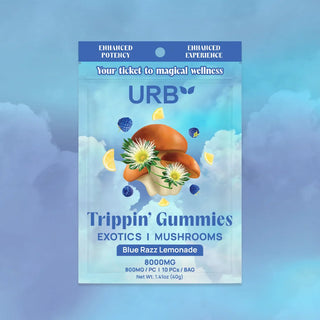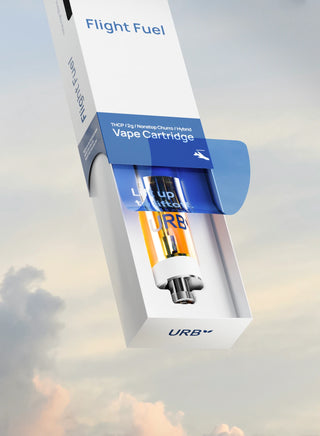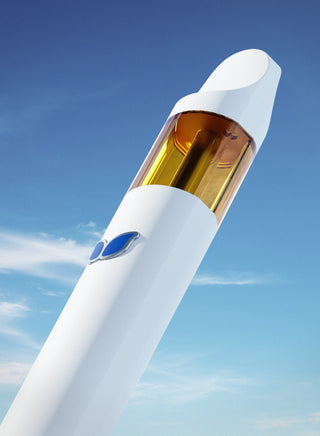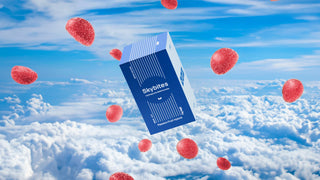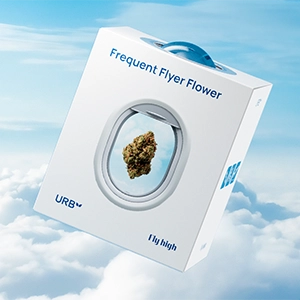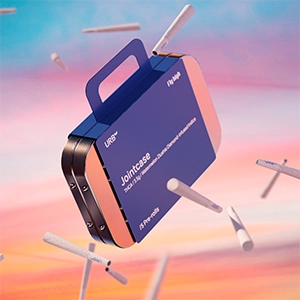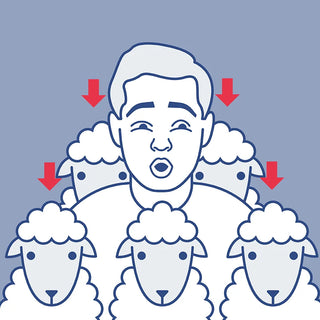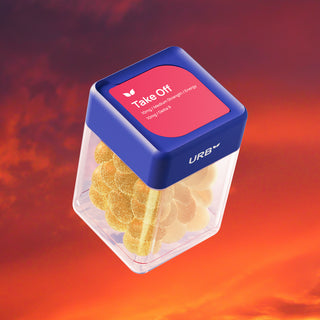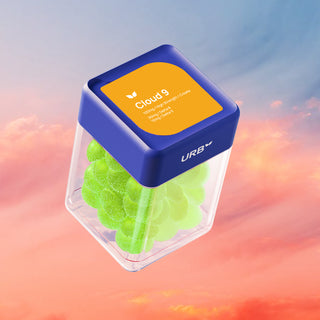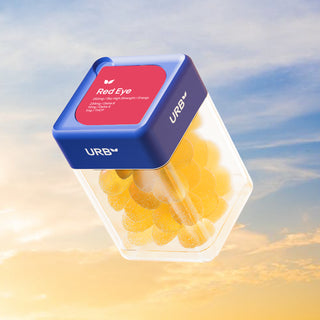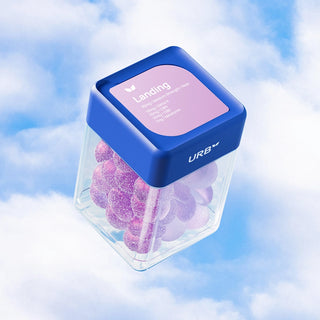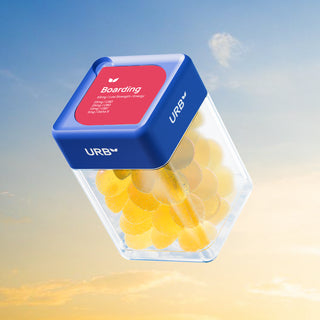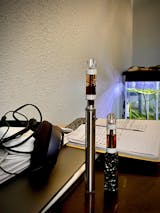If you’ve ever found yourself confused by the alphabet soup of cannabinoids—THCA, Delta 9 THC, Delta 8, and so on—you’re not alone. In this guide, we’re zeroing in on THCA vs Delta 9, breaking down what each compound is, how they interact with your body, and more. Among the topics we’ll explore are:
-
What is THCA?
-
What is Delta 9?
-
What are the legal statuses of the two cannabinoids?
-
How to consume THCA and Delta 9
We’ll also spotlight Urb’s product lineup so you can make a confident choice in your cannabis experience. Ready to explore two unique additions to the cannabis world? Let’s take off!
What Is THCA?
Even if you’ve never heard of THCA, or tetrahydrocannabinolic acid, chances are you’ve encountered it without realizing it. It’s the chemical precursor to Delta 9 THC—the “A” in stands for “acid”—and acts as the foundational compound that transforms into Delta 9 when exposed to heat. On its own, THCA isn’t psychoactive. But that all changes through a process called decarboxylation.
Decarboxylation is the technical term for what happens when THCA’s molecular structure is altered, typically through the application of heat, which removes its carboxyl ring and activates its psychoactive potential. This ring is what keeps THCA from binding to CB1 receptors in the endocannabinoid system (ECS)—a network that helps regulate memory, immune function, pain response, sleep, and more.

Whether it’s THCA, Delta 9, or even certain terpenes, they all interact with the CB1 and CB2 cannabinoid receptor cells in the ECS to produce their unique effects and potential benefits. All in all, in its raw state, THCA won’t produce any psychoactive effects, but as soon as you apply sufficient heat to it, the cannabinoid will transform into Delta 9.
Is THCA Legal?
That depends—and it’s where things get a little complicated. Since raw THCA doesn’t actually contain Delta 9 THC, it exists in a bit of a legal grey area. Under the 2018 Farm Bill, hemp-derived THCA is federally legal as long as the product contains less than 0.3% Delta 9 THC by dry weight.
However, the source matters. Cannabis-derived THCA typically remains federally prohibited, while hemp-derived THCA, which can be produced from other precursor compounds such as CBGA, is generally allowed. That said, state laws vary. In some states, only licensed dispensaries are permitted to sell THCA products legally. Others permit broader retail access, provided the product meets specific labeling and compliance standards. Bottom line: always check local regulations before purchasing to avoid any legal turbulence.
Explore Urb’s full THCA collection to discover vapes, gummies, and premium products that highlight the raw power of this versatile cannabinoid
What Is Delta 9?
Delta 9 THC, or Delta 9 tetrahydrocannabinol, is the major psychoactive compound found in the cannabis plant, and the one primarily responsible for the plant’s wide range of euphoric and mind-altering effects. Like all cannabinoids, it interacts with the body’s endocannabinoid system by binding to cannabinoid receptors in the brain and central nervous system.
Is there a difference between Delta 9 THC and THC? No. Delta 9 is the same as THC. The main reason it’s referred to as “Delta 9” is to distinguish it from other types of THC, such as Delta 8 or Delta 10.
Is Delta 9 Legal?
Yes, but with caveats. If the Delta 9 is derived from the cannabis plant, it’s legal in all states where cannabis is legal. Remember: Delta 9 is the same thing as THC. However, like THCA, Delta 9 can be hemp-derived and converted or synthesized in a laboratory setting. If hemp-derived, it’s generally legal under the 2018 Farm Bill.
The catch? Some worry that hemp-derived Delta 9 products aren’t as safe as cannabis-derived ones because they may not be subject to the same rigorous testing methods. That’s why it’s doubly essential to only purchase from reputable sources such as Urb, where we believe that when you’re flying high, safety comes first. That’s why we provide certificates of analysis (COA) for each and every product we offer.
Browse Urb’s collection of hemp-derived Delta 9 products to explore gummies, vapes, and more—lab-tested for safety, potency, and peace of mind.
THCA vs Delta-9: Effects, Benefits, and Legality
Both THCA and Delta 9 cannabinoids are closely related, but the distinctions matter. Let’s break them down, focusing on their potency and effects, their potential benefits, and their legality.
Potency & Effects
When it comes to raw, unheated THCA versus Delta 9, the two offer very different experiences. Thanks to its additional carboxyl ring, THCA doesn’t interact with the CB1 receptors in your endocannabinoid system the way Delta 9 does. As a result, THCA in its raw form doesn’t produce noticeable psychoactive effects.

However, once THCA undergoes decarboxylation through heat, such as smoking, vaping, or baking, it converts into Delta 9. At that point, the effects of the two cannabinoids are virtually identical. In essence, decarboxylated THCA functions similarly to Delta 9, offering a comparable impact on mood, perception, and overall experience.
Potential Benefits
Early research into THCA has sparked interest for its potential role in our inflammatory response, appetite regulation, and neurological balance. Some studies have explored its possible effects in areas like nausea and seizure activity, though more research is needed to fully understand its mechanisms and applications.
Delta 9, by contrast, is often sought out for its uplifting, relaxing qualities and ability to heighten sensory experiences. If you're exploring for wellness alignment, keep in mind that the form matters—raw THCA, activated Delta 9, and decarboxylated THCA all deliver distinct effects based on how they’re consumed.
Legality
This is where things get a little complex. Here’s how THCA and Delta 9 break down legally:
-
Hemp-derived Delta 9 THC: Federally legal under the 2018 Farm Bill as long as the final product contains less than 0.3% Delta 9 THC by dry weight.
-
Hemp-derived THCA: Federally legal in its raw form, but once heated (decarboxylated), it converts into Delta 9 THC—which could shift its legal status depending on interpretation and enforcement.
-
Cannabis-derived versions of either compound: Federally illegal and subject to individual state cannabis laws.
Because interpretations can vary and laws change frequently, it’s important to check your local and state regulations before purchasing or using any hemp-derived cannabinoid product.
How to Consume THCA and Delta 9
Delta-9 and THCA are found in a wide variety of formats, ranging from fresh flowers to vapes, edibles, and beyond. Here’s a brief survey of the major ones:
-
Vapes: Sleek, portable, and incredibly easy to use, vapes are one of the most popular ways to access Delta-9 and THCA. Products such as our Aerodab 100 Jet Set offer the potency of THCA in the incredibly flavorful live resin format.
-
Edibles: Say goodbye to dry and crumbly brownies, and hello to fresh and fruity gummies! Products such as our Cloud 9 Skybites offer the high-flying effects of Delta 9 THC in a fun-loving, long-lasting package that’s ready to fly wherever you are.
-
Flower: These are cannabis flowers, sometimes known as “bud.” Harvested at peak ripeness and then cured to develop its full flavor, THCA products such as our First Class Flower offer all the flavor of real USA-grown flower in a legal format compatible with the 2018 Farm Bill.
-
Pre-Rolls: Pre-rolls are the same as traditional joints, except the work of rolling them has already been done! Our premium Jointcase offers dispensary-strength THCA flower in three effects-based blends—Relax, Uplift, and Create—and a variety of terpene blends, each selected to take you wherever you want to go.
Whether you're seeking bold flavor, smooth delivery, or subtle elevation, there's a THCA or Delta 9 product in the Urb lineup made just for you.
Not sure where to start? We’ve got you—Urb maintains full COA transparency, so you always know exactly what you’re consuming and how it’s sourced.
Delta 9 vs THCA: Two Ways to Soar to New Heights
While Delta 9 and THCA are closely related, they function quite differently in their natural states. Delta 9 THC is the primary cannabinoid responsible for the plant’s more noticeable effects. THCA, by contrast, isn’t active on its own, but when exposed to heat through a process called decarboxylation, it converts into Delta 9 and delivers a similar experience.
If you’re ready to experience the high-flying effects of these potent cannabinoids for yourself, we’re here to help! Our fleet of Delta 9 and THCA products is ready for takeoff—and you’ve got a first-class seat.
